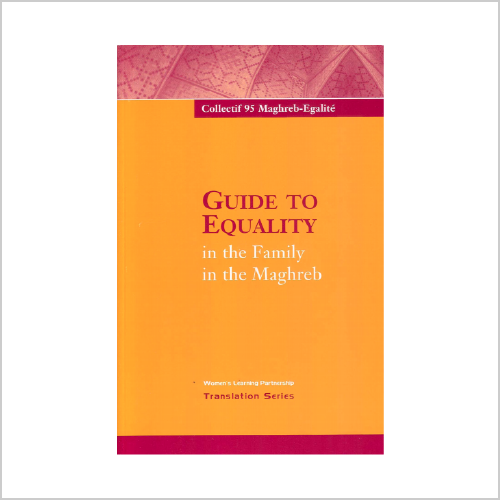Overview
Guide to Equality in the Family in the Maghreb
Collectif 95 Maghreb-Egalité, Women’s Learning Partnership Translation Series (2003)
Click here to download the Guide
Family Law in Muslim-majority societies governs every aspect of a woman’s life—the right to marry, travel, work, inherit land and property, and to pass citizenship on to their children. Promoting equality within the family is an effective strategy for accomplishing women’s freedom and rights while building equitable relations between the sexes.
The Collectif 95 Maghreb-Egalité developed the Guide in Arabic and French for men and women in the Middle East-North Africa region to respond to those who justify discrimination against women based on Islam. Each of the Guide’s 11 thematic modules presents the current law, followed by religious, human rights, sociological, and domestic legal arguments for reform supported by relevant data. Translated by WLP for use by English and Persian-speaking researchers and activists, the Guide to Equality in the Family in the Maghreb highlights the contradictions among so-called religious and culture authorities, and provides alternative evidence for effective democratic and human rights reform.
Available in additional languages.
Book Excerpt
Foreward to the Translation Series by Mahnaz Afkhami
Guide to Equality in the Family in the Maghreb is the first in a translation series initiated by Women’s Learning Partnership for Rights, Development, and Peace (WLP). The goal of the series is to make available to the developed and developing worlds works of importance to women produced in the Global South, especially those that lucidly define women’s issues, identify fields of opportunity, and map out strategies to empower women and to promote women’s human rights. The Dalil, as the Guide is commonly known in the Maghreb, is such a book, produced by WLP’s Moroccan partner Association Démocratique des Femmes du Maroc (ADFM) in collaboration with members of a regional women’s coalition – Collectif 95 Maghreb-Egalité.
The Guide is an advocacy tool developed by women’s organizations from Morocco, Algeria, and Tunisia as an expression of their shared vision for women’s rights. It is unique in that it outlines a process that relates change to women’s capability to choose. Activists struggling to create egalitarian societies in the Muslim-majority world focus mainly on the family laws that govern every aspect of a woman’s life, from minimum age and conditions of marriage, to divorce, child custody, and the right to work, to travel, or to decide upon a place of residence. The Guide provides relevant information and knowledge on family law as it relates to other fields that also affect women’s lives, such as health sciences, sociology, national and international law, religion, and culture, contextualizing the relationship in specific articles of proposed legislation. It thus highlights the contradictions between and among these various fields as they interact with women’s lives within the family, providing an opportunity for individual women to make deliberate and thoughtful choices that lead to effective communication and advocacy.
The Guide treats equality as simultaneously a frame of reference, an evolving social practice, and an action plan. It is an appeal built on four strains of argument:
- A religious argument based on the actual historical diversity of Islamic legal doctrines;
- A legal argument based on national laws;
- A universal law argument stemming from international human rights law and;
- A sociological argument related to social change evidenced in the Maghreb countries.
The Guide provides a good beginning for the WLP Translation Series which is meant as a mechanism for sharing the knowledge and tools that organi- zations, individual activists, and academics have successfully employed to defend and promote women’s rights and to strengthen women’s capacity to impact cultural, religious, and political change.
The WLP Translation Series will make notable works from the Global South, particularly from the Middle East/North Africa region, available throughout the world.
Mahnaz Afkhami
President and CEO
Women’s Learning Partnership

